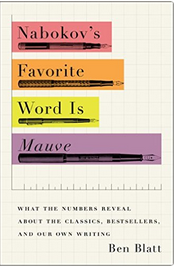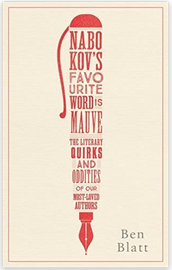 Scholars and would-be writers just got a resource that’s so fascinating they might not be able to get past the data to formulate a thesis of their own. In Nabokov’s Favorite Word is Mauve, Ben Blatt combines statistical analysis and literature to produce a study that quantifies writers’ tendencies. As an article from Publisher’s Weekly notes, “Using a database of thousands of books and hundreds of millions of words, Blatt answers everything from what are our favorite authors’ favorite words to which contemporary writer uses the most clichés to the controversial topic of adverb usage.”
Scholars and would-be writers just got a resource that’s so fascinating they might not be able to get past the data to formulate a thesis of their own. In Nabokov’s Favorite Word is Mauve, Ben Blatt combines statistical analysis and literature to produce a study that quantifies writers’ tendencies. As an article from Publisher’s Weekly notes, “Using a database of thousands of books and hundreds of millions of words, Blatt answers everything from what are our favorite authors’ favorite words to which contemporary writer uses the most clichés to the controversial topic of adverb usage.”
The article “Danielle Steel Loves the Weather and Elmore Leonard Hates Exclamation Points: Literature by the Numbers” shares some of his findings, and of course Updike turns up on the lists.
Which three writers use the least amount of exclamation points per 100,000 words? That would be Elmore Leonard with 49 in 45 novels, followed by Ernest Hemingway with 59 in 10 novels and John Updike with 88 in 26 novels. Who uses the most exclamation points? James Joyce with 1105 in 3 novels, followed by Tom Wolfe (929 in 4 novels) and Sinclair Lewis (844 in 19 novels).
 Which three writers use the least number of clichés per 100,000 words? Jane Austen (45 in 6 novels), Edith Wharton (62 in 22 novels) and Virginia Woolf (62 in 9 novels). Purveyors of the most clichés in their writing? James Patterson (160 in 22 Alex Cross books), Tom Wolfe (143 in 4 novels), and Kurt Vonnegut (140 in 14 novels). Updike was rated as producing 96 per 100,000 words over the course of 26 novels, which was one better than Toni Morrison did over 10 novels and six better than Twain did over the course of 13 novels.
Which three writers use the least number of clichés per 100,000 words? Jane Austen (45 in 6 novels), Edith Wharton (62 in 22 novels) and Virginia Woolf (62 in 9 novels). Purveyors of the most clichés in their writing? James Patterson (160 in 22 Alex Cross books), Tom Wolfe (143 in 4 novels), and Kurt Vonnegut (140 in 14 novels). Updike was rated as producing 96 per 100,000 words over the course of 26 novels, which was one better than Toni Morrison did over 10 novels and six better than Twain did over the course of 13 novels.
What about the weather? Danielle Steel mentioned the weather in the first sentence of her 92 novels a whopping 46 percent of the time, followed by John Steinbeck (26 percent), Nicholas Sparks (22 percent), Willa Cather (21 percent), Stephen King (17 percent), Nora Roberts (16 percent), Tom Clancy (15 percent), Edith Wharton (14 percent), Janet Evanovich (10 percent), Charles Dickens (10 percent), D.H. Lawrence (8 percent), John Updike (8 percent), and Mark Twain (8 percent).
